Located across Dihua Street (迪化街) from Yongle Market (永樂市場) in Taipei, the A.S. Watson & Co (屈臣氏大藥房) building, named for the pharmacy once housed in the imposing corner structure, stood empty for nearly a decade after a fire gutted its interior. Now a collective of creative entrepreneurs plans to give the 92-year-old structure a second life as ArtYard (小藝埕), a cultural center that will preserve the area’s past while attracting a younger crowd to the historic neighborhood.
The three businesses that operate in ArtYard — independent textile brand In Blooom (印花樂, see the Taipei Times on March 9, page 13), ceramics studio Hakka Blue (台客藍) and Luguo Cafe (爐鍋咖啡) — comanage the center as the Sedai Group (世代文化創業群), which was founded by Jou Yi-cheng (周奕成). A performance space called Thinkers Theater (思劇場) will open at the end of this month.
Jou, a lifelong resident of the Minsheng Community (民生社區) who is best known as a political activist and cofounder of the Third Society Party (第三社會黨), frequently crosses Taipei City to explore the streets and alleyways of Dadaocheng (大稻埕). He had hoped to open an arts and culture center in the area for years before the A.S. Watson & Co building became available for rent.
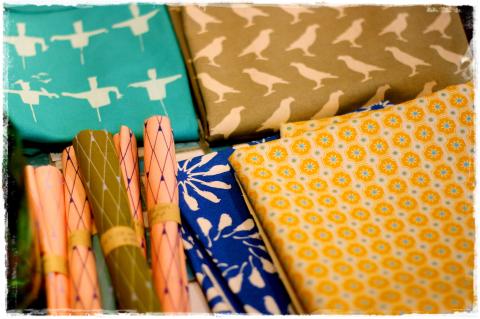
photo: Catherine Shu, Taipei Times
“I felt like it had been waiting for me,” Jou says.
He felt a strong pull to Dadaocheng because “politically, culturally and historically, the area is extremely meaningful to this country.”
STORIED PAST
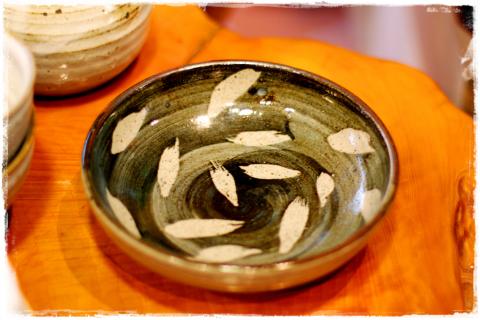
photo: Catherine Shu, Taipei Times
Dadaocheng was once an important trading port and the center of Taiwan’s textile industry. (Yongle Market is still known for its fabric stalls.) The place where agents of the Taiwan Provincial Monopoly Bureau’s Taipei branch (台灣省專賣局台北分局) beat a cigarette vendor on Feb. 27, 1947, triggering the 228 Incident and the beginning of the White Terror Era, is just a few blocks away from ArtYard on Nanjing West Road (南京西路). The neighborhood’s traditional snack shops, many housed in Japanese colonial era buildings, are still a popular destination, especially before Lunar New Year, but Luguo Cafe owner Lu Guo Chieh-he (盧郭杰和) says many visitors don’t take time to explore the area.
“We want to convince people to linger a while, because they usually just stop to buy things before they take off again,” he says. “There weren’t a lot of places in the neighborhood to sit and relax.”
Lu Guo, who also runs a cafe near Guandu MRT Station (關渡捷運站), says he decided to work with the Sedai Group because its “plans are very far-reaching and focused on the long term.”
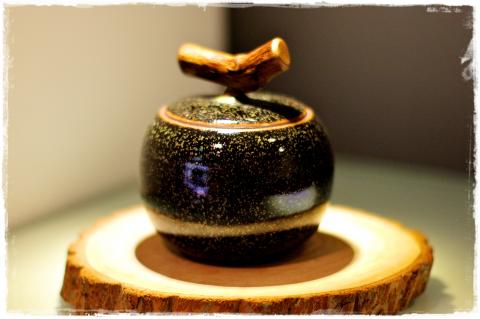
photo: Catherine Shu, Taipei Times
Jou says it is important for Taipei’s residents to create spaces that serve as incubators for arts and culture, preserving the past by allowing members of different generations to meet and exchange stories.
“Both the government and people who care about social issues often get one thing wrong, which is to assume that public spaces must be publicly owned,” he says. “I don’t feel that is true.”
Jou points to the salons and coffeehouses that were instrumental to the creation of public spheres in 18th and 19th century France, Germany and England.
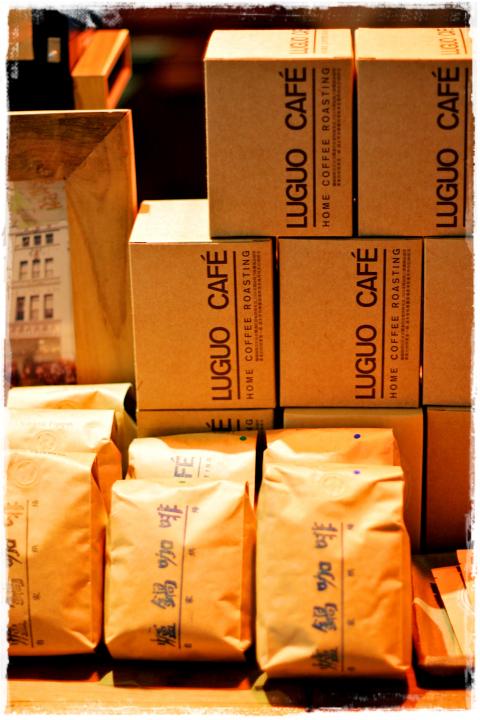
photo: Catherine Shu, Taipei Times
“They were all privately operated, but by people who really care about creativity and culture, and who contributed toward creating very vibrant societies,” Jou says.
HISTORY IN THE MAKING
Jou and his ArtYard partners want to attract the young, intellectually curious people who usually gravitate toward university neighborhoods like Gongguan (公館) and the area around Shida Road (師大路).
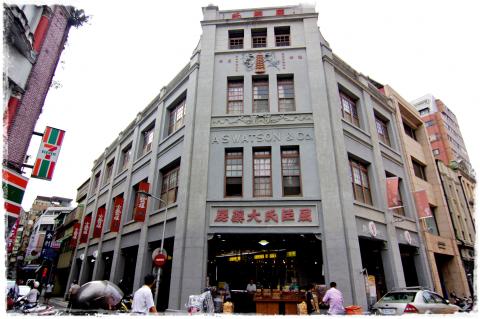
photo: Catherine Shu, Taipei Times
“If you visit a place like Shida Road or Taipei 101, there is nothing in particular to make you think of Taiwan’s past,” Jou says. “But in Dadaocheng, there is an extremely strong sense of history. It calls out to you.”
The A.S. Watson & Co building was constructed in 1919 by members of the Lee (李) family, who were the first in Taiwan to be granted the rights to open a Watson’s brand Western-style pharmacy. (Their original storefront now houses, ironically, a store selling traditional Chinese herbal medicine.)
After a fire destroyed the interior in 1998, the structure, which is still owned by Lee family descendants, stood in disrepair except for a tiny retail space until 2009, when renovations were finally completed.
The different sections of ArtYard have gradually opened since the beginning of the year. In Blooom and Hakka Blue’s shops on the first floor began operating in February. Luguo Cafe launched in April and Thinkers Theater, an intimate space for performances and talks, is scheduled to host its first event within the next few weeks.
The cultural center joins a few other businesses that are hoping to breath new life into the neighborhood, including nearby vintage store Nostalgic Future (意思意思, www.nostalgicfuture.com) and exhibit spaces URS 127 Design Gallery (127公店, tku127.blogspot.com) and URS 44 (www.urstaipei.net).
Despite its plans to attract a younger clientele, ArtYard’s operators say they are mindful of maintaining good relationships with their neighbors, including family businesses that have operated on Dihua Street for decades. The opening time of Luguo Cafe, for example, was set from 11am to 7pm to be in sync with the area’s usual business hours.
“Some people were surprised that we close early compared to other cafes in Taipei, but I told them that we have to fit in with the street’s environment,” Lu Guo says.
Many of the cafe’s visitors are residents of the area.
“We have a lot of tourists come in, but most of our regulars are people who have lived here for a long time, including grandmothers who bring in their grandchildren,” he says.
Center stage
When it opens, Thinkers Theater on the third floor will host music and dramatic performances, as well as talks and readings by authors, playwrights and scholars.
Subjects covered will include history, philosophy and arts and crafts. Despite Jou’s background as an activist, he says Thinkers Theater will avoid specifically political topics.
“If you want to discuss history or philosophy, obviously you cannot ignore politics,” he says. “But we won’t invite political figures unless they are also thinkers.”
Jou is frequently asked if ArtYard receives government funding, but he says the space runs on revenue generated by its three businesses and that Dadaocheng’s growth and renewal is ultimately the responsibility of Taipei City’s citizens.
“The government can fix the roads, the streetlights, the hardware of a neighborhood,” he says. “But when it comes to the software, there is only so much that a government can manage.”

May 18 to May 24 Pastor Yang Hsu’s (楊煦) congregation was shocked upon seeing the land he chose to build his orphanage. It was surrounded by mountains on three sides, and the only way to access it was to cross a river by foot. The soil was poor due to runoff, and large rocks strewn across the plot prevented much from growing. In addition, there was no running water or electricity. But it was all Yang could afford. He and his Indigenous Atayal wife Lin Feng-ying (林鳳英) had already been caring for 24 orphans in their home, and they were in

On May 2, Chinese Nationalist Party (KMT) Chairman Eric Chu (朱立倫), at a meeting in support of Taipei city councilors at party headquarters, compared President William Lai (賴清德) to Hitler. Chu claimed that unlike any other democracy worldwide in history, no other leader was rooting out opposing parties like Lai and the Democratic Progressive Party (DPP). That his statements are wildly inaccurate was not the point. It was a rallying cry, not a history lesson. This was intentional to provoke the international diplomatic community into a response, which was promptly provided. Both the German and Israeli offices issued statements on Facebook

President William Lai (賴清德) yesterday delivered an address marking the first anniversary of his presidency. In the speech, Lai affirmed Taiwan’s global role in technology, trade and security. He announced economic and national security initiatives, and emphasized democratic values and cross-party cooperation. The following is the full text of his speech: Yesterday, outside of Beida Elementary School in New Taipei City’s Sanxia District (三峽), there was a major traffic accident that, sadly, claimed several lives and resulted in multiple injuries. The Executive Yuan immediately formed a task force, and last night I personally visited the victims in hospital. Central government agencies and the

Australia’s ABC last week published a piece on the recall campaign. The article emphasized the divisions in Taiwanese society and blamed the recall for worsening them. It quotes a supporter of the Taiwan People’s Party (TPP) as saying “I’m 43 years old, born and raised here, and I’ve never seen the country this divided in my entire life.” Apparently, as an adult, she slept through the post-election violence in 2000 and 2004 by the Chinese Nationalist Party (KMT), the veiled coup threats by the military when Chen Shui-bian (陳水扁) became president, the 2006 Red Shirt protests against him ginned up by